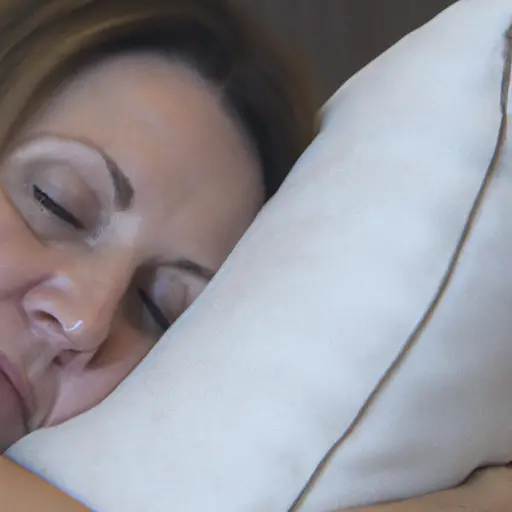Do you ever wake up in the morning feeling groggy and unrested despite getting a full night’s sleep? If so, you may be experiencing what experts call “junk sleep.” But what exactly is junk sleep, and how can you avoid it? In this article, we’ll explore the concept of junk sleep, its potential causes, and provide practical tips on how to improve the quality of your rest. So, grab a cozy blanket, settle into your favorite reading corner, and let’s unlock the secrets to a more rejuvenating slumber!
Table of Contents
What is Junk Sleep?
Definition
Junk sleep refers to a poor quality of sleep that hinders the body’s restorative processes and leaves you feeling unrefreshed upon waking. It is characterized by frequent awakenings, difficulty falling asleep, or waking up too early. While everyone may experience occasional nights of disrupted sleep, junk sleep becomes a concern when it becomes a regular pattern.
Causes
Several factors contribute to junk sleep. It can be caused by lifestyle choices, such as excessive caffeine or alcohol consumption, irregular sleep schedules, or high levels of stress. Environmental factors like noisy surroundings or uncomfortable sleeping conditions can also disrupt sleep and contribute to junk sleep. Additionally, the use of electronic devices before bed can negatively impact sleep quality.
Effects
The effects of junk sleep extend far beyond feeling tired the next day. Chronic junk sleep can lead to a range of negative consequences. Physically, insufficient sleep has been linked to a weakened immune system, weight gain, and an increased risk of chronic conditions such as diabetes and heart disease. Mentally, junk sleep can contribute to mood swings, irritability, difficulty concentrating, and an increased risk of mental health disorders such as anxiety and depression. Furthermore, junk sleep can significantly diminish productivity and overall quality of life.
How to Recognize Junk Sleep
Signs and Symptoms
Recognizing junk sleep is crucial to address the issue effectively. Common signs of junk sleep include difficulty falling asleep or staying asleep, waking up frequently throughout the night, feeling groggy or tired throughout the day, and experiencing daytime sleepiness or fatigue. Other symptoms may include difficulty concentrating, forgetfulness, mood swings, and a decrease in overall performance and alertness.
Sleep Tracking
One effective way to determine if you are experiencing junk sleep is by using sleep-tracking technology. Sleep trackers, such as wearable devices or smartphone apps, can monitor your sleep patterns and provide valuable insights into the duration and quality of your sleep. By analyzing factors like sleep stages, heart rate, and movement, sleep tracking tools can help identify patterns or disruptions in your sleep that may be indicative of junk sleep.
Sleep Quality
Assessing the overall quality of your sleep is also important in recognizing junk sleep. Quality sleep involves achieving an adequate amount of uninterrupted sleep and progressing through the various sleep stages naturally. These stages include non-rapid eye movement (NREM) sleep and rapid eye movement (REM) sleep, each serving different functions in the body’s recovery and restoration processes. If you frequently find yourself waking up tired, experiencing disrupted sleep patterns, or undergoing excessive stage shifts during the night, it may be an indication of poor sleep quality and the presence of junk sleep.
The Impact of Junk Sleep on Health
Physical Health
Junk sleep can have detrimental effects on your physical health. Insufficient sleep has been associated with a weakened immune system, making you more susceptible to illnesses and infections. Moreover, chronic junk sleep has been linked to weight gain and an increased risk of obesity. Sleep deprivation disrupts the hormones that regulate appetite, leading to an increased craving for high-calorie foods and impairing the body’s ability to properly metabolize them. Additionally, lack of sleep can contribute to cardiovascular problems, including high blood pressure and an increased risk of heart disease.
Mental Health
In addition to physical consequences, junk sleep can significantly impact your mental health. Sleep deprivation has been found to increase the risk of developing mental health disorders such as anxiety and depression. Lack of sleep can intensify feelings of stress, irritability, and mood swings, making it difficult to cope with daily challenges. Moreover, junk sleep impairs cognitive function, memory retention, and the ability to concentrate, affecting overall mental performance and productivity. Adequate sleep plays a crucial role in maintaining optimal mental health and emotional well-being.
Productivity
Junk sleep directly affects your productivity and performance in various aspects of life. When you don’t get enough quality sleep, you are likely to experience decreased alertness, poor concentration, and impaired decision-making abilities. This can negatively impact your academic or professional performance, as well as your ability to effectively manage daily tasks and responsibilities. Moreover, junk sleep leads to reduced energy levels and increased fatigue, making it challenging to stay motivated and engaged throughout the day. By prioritizing quality sleep, you can enhance your productivity, efficiency, and overall performance in all areas of life.
Factors Contributing to Junk Sleep
Technology
The use of technology, particularly electronic devices, before bed can disrupt sleep and contribute to junk sleep. The blue light emitted by screens interferes with the body’s natural sleep-wake cycle, making it more difficult to fall asleep and compromises sleep quality. Furthermore, engaging in stimulating activities like playing video games or watching exciting movies can heighten arousal levels and delay the onset of sleep. To avoid junk sleep caused by technology, it is advisable to establish a screen-free bedtime routine and limit screen time to at least an hour before bedtime.
Stress
Excessive stress is a significant contributor to junk sleep. When you are overwhelmed by stress, it can be challenging to relax and wind down before bed, resulting in difficulty falling asleep or staying asleep throughout the night. Stress also triggers the release of cortisol, a stress hormone that can interfere with sleep patterns. To combat stress-induced junk sleep, incorporating stress-management techniques into your daily routine, such as practicing mindfulness or engaging in relaxation exercises, can help promote a calm and peaceful mindset before bed.
Poor Sleep Hygiene
Poor sleep hygiene refers to habits and practices that are detrimental to quality sleep. Irregular sleep schedules, inconsistent bedtime routines, and an unsupportive sleep environment can all contribute to junk sleep. Establishing a consistent sleep schedule, with regular bedtimes and wake-up times, helps regulate the body’s internal clock and promote better sleep quality. Additionally, creating a relaxing bedtime routine, such as reading a book or taking a warm bath, signals to the body that it is time to wind down. Finally, optimizing the sleep environment with factors like comfortable bedding, a cool and dark room, and minimizing noise can significantly improve sleep quality.
The Importance of Quality Sleep
Benefits of Quality Sleep
Quality sleep plays a vital role in overall health and well-being. It is during sleep that the body repairs and rejuvenates itself, allowing for optimal physical and cognitive functioning. Adequate quality sleep boosts the immune system, improving resistance to infections and promoting faster healing. It enhances cognitive function and memory consolidation, improving learning and problem-solving abilities. Quality sleep also contributes to emotional well-being, helping regulate mood and emotions, and reducing the risk of mental health disorders. Lastly, good sleep supports physical performance and exercise recovery, aiding in muscle growth and repair.
The Sleep Cycle
Understanding the sleep cycle is essential in recognizing how quality sleep is achieved. The sleep cycle consists of multiple stages, alternating between non-rapid eye movement (NREM) sleep and rapid eye movement (REM) sleep. NREM sleep is divided into three stages: stage 1, a light sleep; stage 2, a deeper sleep with reduced muscle activity; and stage 3, deep sleep, also known as slow-wave or delta sleep. REM sleep, often associated with dreams, occurs after the stages of NREM sleep. The ideal sleep cycle involves progressing through these stages in a synchronized manner, with each stage serving different physiological and psychological functions.
Sleep Recommendations
To ensure optimal health and well-being, it is recommended that adults aim for 7-9 hours of quality sleep per night. However, individual sleep needs may vary, so it is essential to pay attention to your own body’s signals and adjust accordingly. Establishing a consistent sleep schedule, including consistent bed and wake times, is crucial in regulating the sleep-wake cycle. Creating a sleep-friendly environment, optimizing sleep hygiene practices, and managing stress levels also contribute to achieving recommended sleep durations and quality.
Tips for Improving Sleep Quality
Establishing a Consistent Schedule
Maintaining a consistent sleep schedule is one of the most effective ways to improve sleep quality. Set a regular bedtime and wake-up time, even on weekends, and stick to it as closely as possible. This regularity helps regulate the body’s internal clock and promotes a more restful night’s sleep. Additionally, practicing good sleep consistency can help minimize sleep onset latency, reduce awakenings during the night, and improve overall sleep efficiency.
Creating a Relaxing Bedtime Routine
Engaging in a relaxing bedtime routine can prepare your mind and body for sleep. This routine can involve activities such as reading a book, taking a warm bath, practicing gentle stretching exercises, or engaging in relaxation techniques such as deep breathing or meditation. As you establish a calming routine, it becomes a signal to your body that it is time to wind down and prepare for a restful night’s sleep.
Promoting a Sleep-Friendly Environment
Creating a sleep-friendly environment is crucial in optimizing sleep quality. Ensure your bedroom is cool, dark, and quiet by using blackout curtains, earplugs, or white noise machines. Investing in a comfortable mattress, pillows, and bedding that suit your preferences can also contribute to a better sleep experience. Avoid bringing work or electronics into the bedroom to create a space reserved solely for relaxation and sleep.
Avoiding Stimulants and Sleep Disruptors
Caffeine and Alcohol
Avoiding stimulants, such as caffeine and alcohol, close to bedtime can greatly improve sleep quality. Caffeine, found in coffee, tea, and energy drinks, can interfere with sleep onset and increase the number of awakenings during the night. It is advisable to limit or avoid consuming caffeine at least 4-6 hours before bed. While alcohol may initially make you feel drowsy, it disrupts the natural sleep cycle and exacerbates sleep apnea and snoring. It is best to limit alcohol intake, particularly in the evening, to ensure uninterrupted and restorative sleep.
Screen Time
The use of electronic devices before bed can negatively impact sleep quality. The blue light emitted by screens suppresses the production of melatonin, a hormone that helps regulate sleep. To promote quality sleep, it is essential to establish a screen-free period before bed. Avoid using smartphones, tablets, or laptops at least an hour before bedtime, or consider using blue light filters or glasses that block the harmful light spectrum.
Exercise Timing
Regular physical activity is beneficial for sleep, but the timing of exercise plays a role in optimizing sleep quality. Engaging in vigorous exercise too close to bedtime can increase alertness and make it difficult to fall asleep. It is recommended to finish moderate to intense workouts at least 2-3 hours before bedtime. On the other hand, light exercises like stretching or yoga before bed can help promote relaxation and improve sleep quality.
Using Technology to Optimize Sleep
Sleep Tracking Devices
Sleep tracking devices, such as wearable fitness trackers or smartwatches, can provide valuable insights into your sleep patterns and help identify areas for improvement. These devices use sensors to monitor your heart rate, movement, and sleep stages throughout the night, providing detailed analysis and data. By tracking your sleep over time, you can gain a better understanding of your sleep patterns and make informed adjustments to your sleep habits and routines.
Sleep Apps
Sleep apps are an accessible and convenient tool for optimizing sleep. These apps often offer features such as sleep tracking, guided meditation or relaxation exercises, and soothing sounds or white noise. They can also provide sleep-related education, tips, and reminders to maintain healthy sleep practices. Exploring different sleep apps and finding one that aligns with your preferences and needs can be beneficial in improving sleep quality.
White Noise Machines
White noise machines produce a consistent, soothing sound that can mask disruptive noises and promote a more peaceful sleep environment. These machines emit sounds similar to the hum of a fan or static, which can be effective in drowning out background noises and disturbances. White noise machines can be particularly beneficial for individuals who are sensitive to noise or live in areas with high levels of ambient sounds.
Seeking Professional Help for Sleep Issues
When to Consult a Doctor
It is essential to seek professional help if you consistently experience junk sleep or suspect an underlying sleep disorder. If your sleep issues persist despite implementing healthy sleep practices, or if they significantly impact your daily life and overall well-being, consulting a healthcare provider is recommended. Sleep disorders such as insomnia, sleep apnea, restless legs syndrome, or narcolepsy require professional evaluation and treatment to improve sleep quality and address any underlying causes.
Sleep Disorder Treatments
Medical interventions are available for various sleep disorders. Treatment options may include lifestyle modifications, such as adopting healthy sleep habits and stress management techniques, or medical interventions like sleep aids or devices. Healthcare professionals can conduct diagnostic tests, such as a sleep study, to identify the specific sleep disorder and tailor treatment plans accordingly. Collaborating with medical experts ensures a comprehensive approach to addressing sleep issues and promoting optimal sleep quality.
Therapies and Sleep Experts
For individuals experiencing persistent sleep difficulties, therapies and consultations with sleep experts provide valuable guidance and support. Cognitive-behavioral therapy for insomnia (CBT-I) is a proven approach that helps individuals identify and modify the thoughts and behaviors contributing to sleep problems. Sleep experts, including sleep psychologists, therapists, or counselors, can offer personalized strategies for improving sleep quality and addressing specific concerns. These professionals provide evidence-based interventions and techniques to promote healthy sleep and overall well-being.
Conclusion
Junk sleep, characterized by poor sleep quality, can have a significant impact on physical health, mental well-being, and overall productivity. Identifying signs of junk sleep, understanding its causes, and recognizing its negative effects are the first steps toward prioritizing quality sleep. By implementing strategies to improve sleep habits, creating a sleep-friendly environment, and avoiding sleep disruptors, you can optimize your sleep quality and reap the numerous benefits of restful, rejuvenating sleep. When necessary, do not hesitate to seek professional help to address underlying sleep disorders and receive tailored treatment plans. Remember, healthy sleep is a vital component of a fulfilling and vibrant life. Sleep well and wake up refreshed!




